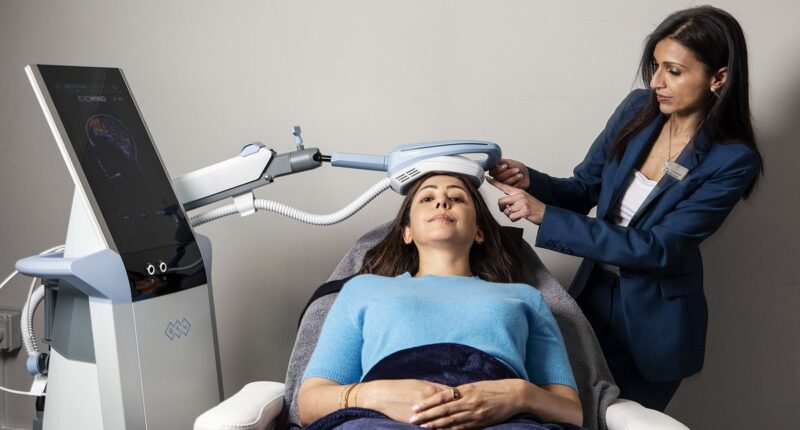Like many of us who are balancing careers and family responsibilities, my mind often feels overwhelmed, resembling a browser with multiple tabs open simultaneously. I constantly cycle through to-do lists, worst-case scenarios, and unnecessary worries about things that are unlikely to occur.
I first recognized my anxiety in my mid-30s, and since then, it has continued to grow. As I am now in my mid-40s, I believe that the hormonal shifts during perimenopause may also be exacerbating these emotions.
I’m not alone: according to the Mental Health Foundation, a third of men and women report feeling high levels of anxiety.
According to Dr. Mohamed Abdelghani, a consultant psychiatrist at North London NHS Foundation Trust, “Anxious brains function like overactive alarms, interpreting everyday situations as being more intense than they are.”
‘This can affect key areas of the brain, such as the dorsolateral prefrontal cortex, which is responsible for cognitive function, behaviour and emotional responses.’
When anxiety persists, it can lead to chronic stress. Physically, this can raise the risk of conditions such as heart disease, digestive issues and weakened immunity. Mentally, it may contribute to low mood and disrupted sleep.
I’ve never seen a GP about my anxiety, mainly because I have wanted to avoid medication. I tend to rely on coping methods such as journaling – but I do find myself craving a more consistent sense of calm, not to mention better sleep.
So when I was invited to try Exomind – a new brain-stimulating device that claims to ‘reset’ the brain circuits responsible for mood in a series of 30-minute sessions – I was curious to see if it could help.

Anjana Gosai was invited to try Exomind, a new brain-stimulating device that claims to ‘reset’ the brain circuits responsible for mood in a series of 30-minute sessions

The technology uses transcranial magnetic stimulation – which delivers magnetic pulses to the scalp, in turn stimulating specific areas of the brain such as the prefrontal cortex

Anjana had never seen a GP about her anxiety, mainly because she wanted to avoid medication
Recently launched in the UK, it uses transcranial magnetic stimulation (TMS) – which delivers magnetic pulses to the scalp, in turn stimulating specific areas of the brain such as the prefrontal cortex, which is involved in emotional regulation and cognitive function.
And there is evidence to show that TMS can help: clinical trials have shown that this technology can improve depression, sleep quality and cognitive function.
For example, a 2018 study in the journal Neuropsychopharmacology reported that patients with depression were significantly more likely to no longer have symptoms after receiving TMS treatment (five days a week, for a month) compared with a group that received sham therapy. Although it’s worth noting there was no long-term follow-up to assess the duration of remission.
TMS is available on the NHS, but only a few regions offer it – and then only for depression.
But some experts believe TMS can be effective for other conditions, such as anxiety.
‘By stimulating the regions of the brain that are involved in mood regulation, TMS can help “reboot” the brain cells, improve communication between regions and increase the release of neurotransmitters – chemical messengers such as serotonin, dopamine and norepinephrine, helping to stabilise mood and gradually ease symptoms of depression and anxiety,’ explains Dr Abdelghani.
Results of five clinical studies using Exomind, focusing on evaluating its impact on mental wellbeing, self-control and eating behaviour, are expected to be published this year (the company says these have been carried out by independent universities or research clinics, though additional details are currently not disclosed).
Exomind, which is currently available only in private clinics, costs from £500 per session. The number of sessions varies from patient to patient. After an initial consultation for Exomind and completing a mental wellness questionnaire, I underwent a course of four, weekly treatments.
I’d been warned of potential side effects, such as headaches, fatigue and scalp tenderness – and, in rare cases, seizures – so I was a little nervous to start.
But as I sat on the clinic bed and the device – which looks a bit like a chunky iPad – was placed over the left side of my head, all I felt was a gentle tapping motion, and after about 15 minutes I was a little sleepy.
After the 30-minute treatment, I drove home but it was like my brain had been through a workout – I was so tired, I napped as soon as I got in. I still felt mentally tired the next morning, but my alertness returned by the afternoon.
After my third treatment, I noticed a change in my anxiety. I wasn’t as easily triggered by small inconveniences and found myself able to pause and rationalise – almost like something had clicked, giving me more control over the thoughts that used to feel catastrophic.
Dr Abdelghani, who does not offer Exomind, says: ‘TMS could be a possible option for those seeking drug-free interventions for anxiety. It often works faster than medication such as diazepam – and without the side effects. Unlike drugs, which affect the whole body, TMS targets specific brain areas.’
He adds: ‘Expanding access to TMS is a positive step – but safety must come first.
‘Patients should ensure their doctor has received quality training and specialises in the condition being treated. Treatment should also be overseen by experts in brain function and neurostimulation, who have appropriate certification from reputable organisations, such as the Clinical TMS Society [an international body based in the US], to ensure effectiveness and safety,’ he advises.
Currently, the UK lacks national standards for who can administer TMS – whether in the NHS or private sector, meaning that, technically, any aesthetics practitioner can offer it.
Furthermore, some experts believe we need more robust evidence for TMS in tackling anxiety.
Dr Charlotte Marriott, an NHS psychiatrist based in Worcestershire, says: ‘While TMS shows some potential, more research is required before it can be confidently recommended as a treatment for all anxiety disorders.’
She also stresses the importance of a thorough assessment by a GP or psychiatrist for anyone experiencing moderate to severe anxiety symptoms before starting any treatment.
‘Although TMS is generally safe and well-tolerated, it isn’t risk-free,’ adds Dr Marriott.
‘As well as headaches, lightheadedness and minor muscle spasms, seizures can occur – although rare – in fewer than one in 1,000 cases. TMS is not suitable for people with epilepsy or who have pacemakers and non-removable metal implants near the head.’
So has Exomind helped me? Three months on, I certainly feel calmer and more in control of my mind, although it’s difficult to say definitively, without before and after tests to monitor my brain activity – and it could just be a placebo effect.
- The writer’s Exomind sessions were provided free.

















